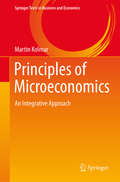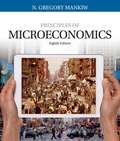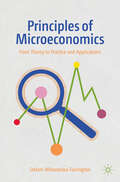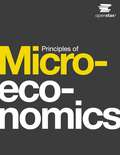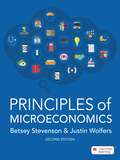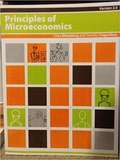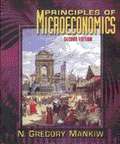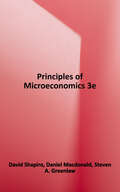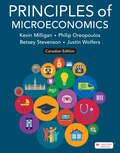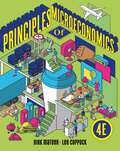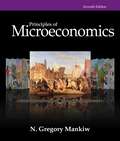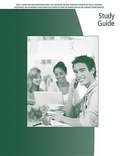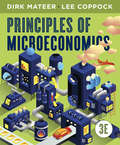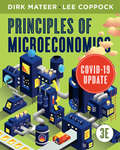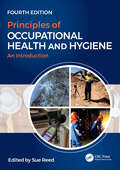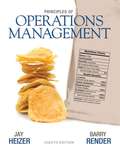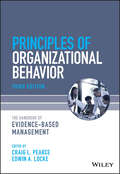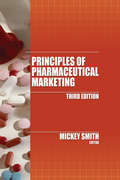- Table View
- List View
Principles of Microeconomics: An Integrative Approach (Springer Texts in Business and Economics)
by Martin KolmarThis text provides a comprehensive and unique introduction to modern microeconomics. It pursues an integrative approach by putting the main findings of economics into a broader perspective; theories are critically reflected on from a philosophical standpoint and by comparing them to approaches found in the social sciences, while implications for the design of the legal system and business practices are highlighted throughout. In addition, the book presents brief examples and comprehensive case studies to facilitate an understanding of the theories’ real-world implications.Starting from the question as to why and how societies organize economic activity, the book adopts an institutional perspective to analyze the potential and limitations of different market types with regard to alleviating scarcity and achieving distributive objectives.It not only covers traditional rational-choice models, but also systematically introduces readers to important findings from behavioral economics and psychology.A companion workbook is available which features a wide variety of exercises, ranging from basic multiple-choice questions to challenging mathematical problems and case study scenarios.
Principles Of Microeconomics
by N. Gregory MankiwNow readers can master the principles of microeconomics with the help of the most popular introductory book in economics today that is widely used around the world -- Mankiw’s PRINCIPLES OF MICROECONOMICS, 8E. <P><P>With its clear and engaging writing style, this book emphasizes only the material that readers are likely to find most interesting about the economy, particularly if they are studying economics for the very first time. <P><P>Reader discover interesting coverage of the latest relevant microeconomic developments with real-life scenarios, useful economic facts, and clear explanations of the many ways microeconomic concepts play a role in the decisions that individuals make every day.
Principles of Microeconomics: From Theory to Practice and Applications
by Stefani Milovanska-FarringtonThis textbook offers a comprehensive overview of microeconomics, featuring teachable and applicable approaches to core concepts. It includes fresh examples and applications to help students understand and apply opportunity cost, choice theory, and more to their own world. Throughout the book, there are practice problems with step-by-step solutions that help students better understand the topics covered. Sections provide scenarios to help students analyze consumer choices as well as the decisions of firms. Readers will learn how to evaluate the impact of microeconomic policies and how to perform equilibrium analysis. The author publishes digital worksheets with questions based on recent news stories that readers can use as they work through the book: https://econstefani.substack.com/. The book, combined with these free materials, introduces new and fresh approaches to help students apply fundamental concepts to the world around them. The resulting book is a valuable learning tool that highlights microeconomic principles for a new generation of learners.
Principles of Microeconomics
by OpenStaxPrinciples of Microeconomics covers the scope and sequence for a one-semester economics course. The text also includes many current examples, including; the Keystone Pipeline, Occupy Wall Street, and debates over the minimum wage. The pedagogical choices, chapter arrangements, and learning objective fulfillment were developed and vetted with feedback from educators dedicated to the project. The outcome is a balanced approach to economics and to the theory and application of economics concepts. Current events are treated in a politically-balanced way, as well.
Principles of Microeconomics
by Libby Rittenberg Timothy TregarthenToday we are excited to introduce Libby Rittenberg and Timothy Tregarthen’s Principles of Microeconomics. The authors teach economics as the study of “choice “ by providing students with an accessible, straightforward overview of economics. This text combines the clarity and writing of Tregarthen's seminal periodical "The Margin" with great teaching insights. Rittenberg and Tregarthen help students to understand how real individuals actually work with economics. In this new book, the authors illustrate the practicality and relevance of economics with a variety of new illustrations and insights. The authors take a three-pronged approach to every concept: (1) the concept is covered with a “Heads Up” to ward off confusion, (2) a “You Try It” section makes sure students are staying on top of the concept and (3) a “Case and Point” section that uses a real-world application to harness the concept in reality.
Principles of Microeconomics
by Libby Rittenberg Timothy TregarthenIn Principles of Microeconomics, the authors explore how political outcomes of events, such as Brexit and the election of Donald Trump, affect economic policies and economic outcomes. Throughout the last decade, economists have received the public’s attention, and the authors saw an opportunity to share economic principles and thinking in a way that emphasizes their relevance in today’s world.
Principles of Microeconomics
by Betsey Stevenson Justin WolfersStevenson/Wolfers is built around the idea that ‘every decision is an economic decision’. It is the perfect choice for Principles of Economics courses and for economics majors and nonmajors alike.
Principles of Microeconomics: Economics and the Economy
by Timothy TaylorThis fourth edition teaches the tools and principles that are standard for introductory economics, in a way that students can see the applications for the U.S. and world economy. The facts, anecdotes, and explanations have been scrutinized and updated throughout. Some new examples include high-profile topics at key points, like using the rise in demand for sand from fracking for principles of supply and demand, or explaining how the Federal Reserve is now conducting monetary policy by varying the interest rate paid on bank reserves. Tim Taylor has provided a complete updating of numerical graphs and statistics. In addition, this book has been structured since the first edition to mix in international topics and to consider product, labor, and capital markets side by side, which helps it apply easily to so many of the topics now in the news: effects of globalization on growth and labor markets, budget deficits, the minimum wage, health insurance, and many more.
Principles of Microeconomics 2.0
by Libby Rittenberg Timothy TregarthenFlat World Knowledge is honored to publish Version 2.0 (an orginal re-launch) of Tim Tregarthen's wonderful principles of microeconomics book, and proud to bring Tim's incredible talents as a teacher back to life so future generations of students can continue to learn from him.
Principles of Microeconomics (2nd Edition)
by N. Gregory MankiwIn this textbook, Mankiw's conversational writing style helps in presenting the politics and science of economic theories to tomorrow's decision-makers. The book is intriguing students to apply an economic way of thinking in their daily lives.
Principles of Microeconomics (2nd Edition)
by Timothy TaylorA textbook that is rooted to help students perform well in introductory economics and acquire the basic tools to deal with economics.
Principles of Microeconomics, 3e
by David Shapiro Daniel Macdonald Steven A. GreenlawPrinciples of Microeconomics 3e covers the scope and sequence of most one-semester introductory microeconomics courses. The third edition takes a balanced approach to the theory and application of microeconomics concepts. The text uses conversational language and ample illustrations to explore economic theories and provides a wide array of examples using both fictional and real-world applications. The third edition has been carefully and thoroughly updated to reflect recent developments, as well as to provide a deeper background in diverse contributors and their impacts on economic thought and analysis. For example, the third edition highlights the research and views of a broader group of economists. This is the official print version of this OpenStax textbook. OpenStax makes full-color hardcover and B&W paperback print copies available for students who prefer a hardcopy textbook to go with the free digital version of this OpenStax title. The textbook content is exactly the same as the OpenStax digital book. This textbook is available for free download at the OpenStax dot org website, but as many students prefer to study with hardcopy books, we offer affordable OpenStax textbooks for sale through Amazon as well as most campus bookstores.
Principles of Microeconomics (4th edition)
by N. Gregory MankiwEconomics combines the virtues of politics and science. It is, truly, a social science. Its subject matter is society-- how people choose to lead their lives and how they interact with one another. But it approaches the subject with the dispassion of a science. By bringing the methods of science to the questions of politics, economics tries to make progress on the challenges that all societies face. This book is devoted more to applications-- and less to formal economic theory. Most chapters include case studies illustrating how the principles of economics are applied. Although the principles of economics are timeless, the application of those principles changes over time as events unfold and as policymakers consider new initiatives. To keep the study of economics fresh and relevant for each new cohort of students, teachers of economics must constantly update their courses. This new edition contributes to that effort by including dozens of new case studies and boxes.
Principles of Microeconomics Canadian Edition
by Kevin Milligan Philip Oreopoulos Betsey Stevenson Justin WolfersPrinciples is built around the idea that “every decision is an economic decision.” It is the perfect choice for Canadian principles of economics courses and for economics majors and nonmajors alike.
Principles of Microeconomics (Fourth Edition)
by Dirk Mateer Lee CoppockMateer and Coppock Make Economics for Everyone Drawing on their extensive teaching experience in the classroom and online, Mateer and Coppock continuously innovate to address the changing teaching and learning challenges faced by instructors and students. The Fourth Edition introduces new scaffolded learning pedagogy with a Norton Illumine Ebook as well as revised InQuizitive and Smartwork activities that provide personalized support and build problem-solving skills. New relevant and relatable examples ensure that students understand how their lives are influenced by economics, and rich Norton Teaching Tools resources help instructors connect with students before, during, and after class. This purchase offers access to the digital ebook only.
Principles Of Microeconomics (Seventh Edition)
by N. Gregory MankiwWith its clear and engaging writing style, PRINCIPLES OF MICROECONOMICS, Seventh Edition, continues to be one of the most popular books on economics available today. Mankiw emphasizes material that you are likely to find interesting about the economy (particularly if you are studying economics for the first time), including real-life scenarios, useful facts, and the many ways economic concepts play a role in the decisions you make every day.
Principles of Microeconomics Study Guide
by N. Gregory Mankiw David R. HakesTo help you use it efficiently, this Study Guide focuses strictly on the material presented in Mankiw's Principles of Microeconomics, Third Edition.
Principles of Microeconomics (Third Edition)
by Dirk Mateer Lee CoppockRelatable economics is memorable economics Widely praised by adopters as the most relatable textbook available, Mateer and Coppock’s Third Edition of Principles of Economics develops students’ problem-solving skills with step-by step explanations and familiar applications and examples. Principles of Economics makes economics memorable for an exam and a lifetime. This purchase offers access to the digital ebook only.
Principles of Microeconomics (Third Edition): Covid-19 Update
by Dirk Mateer Lee CoppockHelping you explain a different world Students and instructors are living through a pandemic that has changed how and what they teach, and how and where they learn. The COVID-19 Update of Principles of Economics, Third Edition, provides the information that students need to make sense of the impacts COVID-19 has had on the economy. The Update Edition has been completely revised to include new examples, new data, new policies, and more. All of Norton’s digital resources fully integrate with most learning management systems, providing the flexibility instructors need in this changed world. This purchase offers access to the digital ebook only.
Principles of Microeconomics Version 2.0
by Libby Rittenberg Timothy TregarthenFlat World Knowledge is honored to publish Version 2.0 (an orginal re-launch) of Tim Tregarthen's wonderful principles of microeconomics book, and proud to bring Tim's incredible talents as a teacher back to life so future generations of students can continue to learn from him.
Principles of Occupational Health and Hygiene: An Introduction, Fourth Edition
by Sue ReedNow in its fourth edition, this book allows for early career occupational hygienists and occupational health and safety professionals or students to develop their basic skills and knowledge to anticipate, recognize, evaluate, and control workplace hazards that can result in injury, illness, impairment, or affect the well-being of workers and members of the community. Principles of Occupational Health and Hygiene: An Introduction, Fourth Edition offers a comprehensive overview of occupational health risks and hazardous environments encountered in a range of industries and organizational settings.This new edition offers information on the current techniques and equipment used in assessing workplace hazards. Methods of assessment are developing at a rapid rate due to the new technologies now available. Featuring new chapters on occupational hygiene statistics and psychosocial hazards and fully updated throughout, leading industry professionals and educators explain how to identify key workplace hazards including chemical agents such as dusts, metals and gases; physical agents such as noise, radiation and extremes of heat and cold; and microbiological agents. The book highlights assessment procedures and processes for identifying exposure levels and explains how to evaluate risk and follow safety guidelines to control and manage these hazards effectively. Highly illustrated, up to date with current Workplace Health and Safety legislation and written in a jargon-free manner, this book will be a bible to any student or professional.Principles of Occupational Health and Hygiene: An Introduction, Fourth Edition is an essential reference for students, early career Occupational Hygienists professionals and anyone in an Occupational Health and Safety role.
Principles of Operations Management (Eighth Edition)
by Jay Heizer Barry RenderThis book presents a state-of-the- art view of the activities of the operations function. This book will also help you understand how OM affects society and your life.
Principles of Organizational Behavior: The Handbook of Evidence-Based Management
by Craig L. Pearce Edwin A. LockeExplore invaluable management advice informed by the latest in organizational and industrial behaviour research In the newly revised Third Edition of Handbook of Principles of Organizational Behavior: Indispensable Knowledge for Evidence-Based Management, world-renowned organizational behaviourists Edwin A. Locke and Craig L. Pearce deliver a comprehensive and authoritative discussion of sound management practices informed by the most recent evidence and research in organizational and industrial psychology. In the book, the authors present: Complimentary and downloadable video material linked to each chapter Executive interviews and author interviews, new cases, assessments, inventories and exercises Updated chapters written by world-leading experts on the covered topicsAn indispensable resource for students of human resources, organizational behaviour, industrial psychology, public administration and related subjects, Handbook of Principles of Organizational Behavior will assist students and professionals seeking the latest evidence-based management guidance.
Principles of Pharmaceutical Marketing
by Mickey C. Smith Ph.D.Principles of Pharmaceutical Marketing, Third Edition offers the perspectives of both those who teach and those who practice pharmaceutical marketing. This reflects the need for and the effort to provide the most relevant “real world” approach to this complex and fascinating field. This text is designed for undergraduate students in pharmacy whose background in marketing is limited, those actually involved in pharmaceutical marketing, and anyone desiring an introduction to the intricacies involved in the marketing of pharmaceutical products.
Principles of Political Economy
by Wilhelm RoscherWilhelm Georg Friedrich Roscher was a German economist from Hanover. He studied at Göttingen, where he became a member of Corps Hannovera, and Berlin, and obtained a professorship at Göttingen in 1844, and subsequently at Leipzig in 1848. The main origins of the historical school of political economy may be traced to Roscher. Roscher tried to establish the laws of economic development by using the historical method from investigation of histories legal, political, cultural and other aspects, and developed a cyclical theory where nations and their economies pass though youth, manhood, and senile decay.
